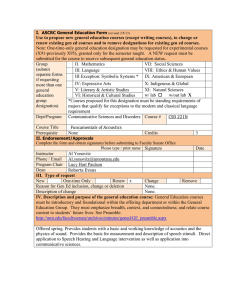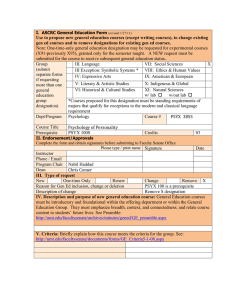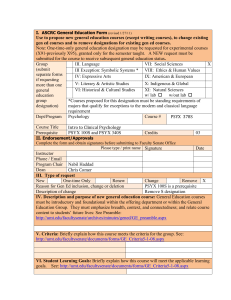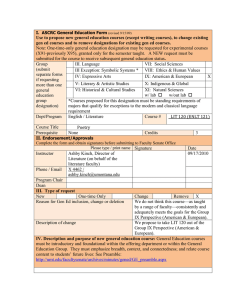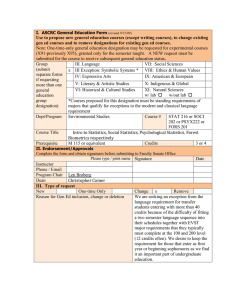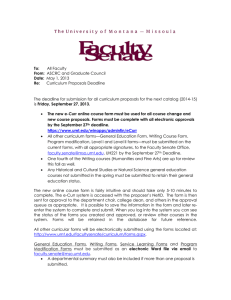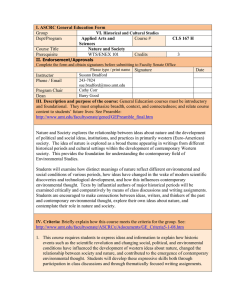Use to propose new general education courses (except writing courses),... gen ed courses and to remove designations for existing gen...
advertisement
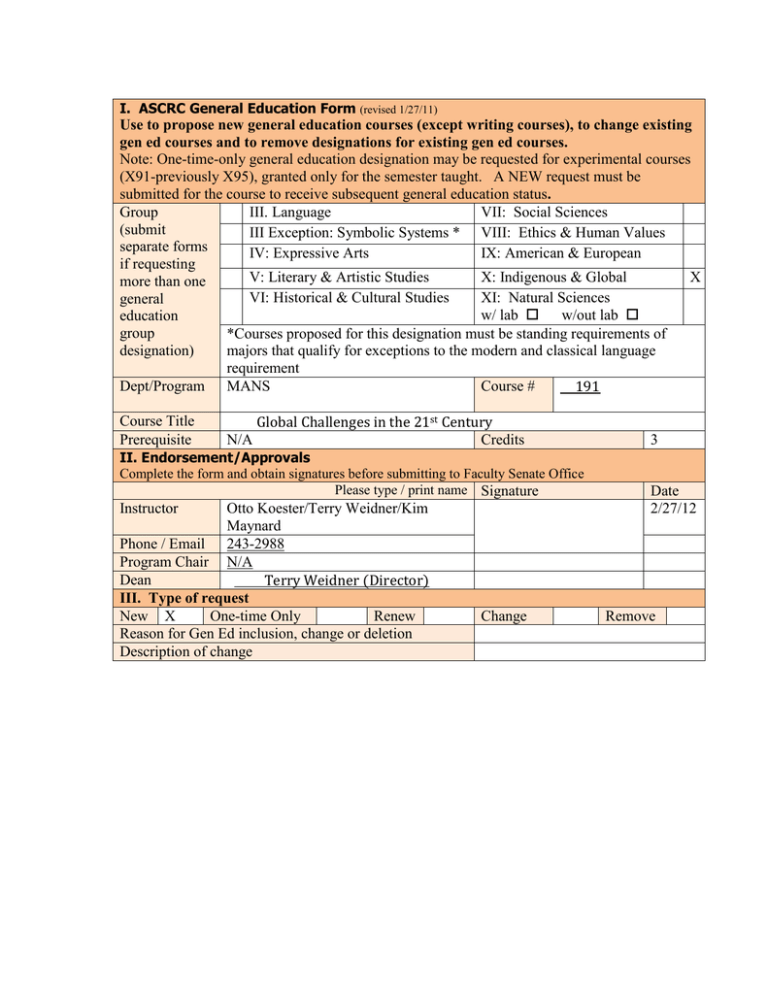
I. ASCRC General Education Form (revised 1/27/11) Use to propose new general education courses (except writing courses), to change existing gen ed courses and to remove designations for existing gen ed courses. Note: One-time-only general education designation may be requested for experimental courses (X91-previously X95), granted only for the semester taught. A NEW request must be submitted for the course to receive subsequent general education status. Group III. Language VII: Social Sciences (submit III Exception: Symbolic Systems * VIII: Ethics & Human Values separate forms IV: Expressive Arts IX: American & European if requesting V: Literary & Artistic Studies X: Indigenous & Global X more than one VI: Historical & Cultural Studies XI: Natural Sciences general w/ lab w/out lab education group *Courses proposed for this designation must be standing requirements of designation) majors that qualify for exceptions to the modern and classical language requirement Dept/Program MANS Course # 191 Course Title Prerequisite Global Challenges in the 21st Century N/A Credits II. Endorsement/Approvals Complete the form and obtain signatures before submitting to Faculty Senate Office Please type / print name Signature Instructor Otto Koester/Terry Weidner/Kim Maynard Phone / Email 243-2988 Program Chair N/A Dean Terry Weidner (Director) III. Type of request New X One-time Only Renew Reason for Gen Ed inclusion, change or deletion Description of change Change 3 Date 2/27/12 Remove IV. Description and purpose of new general education course: General Education courses must be introductory and foundational within the offering department or within the General Education Group. They must emphasize breadth, context, and connectedness; and relate course content to students’ future lives: See Preamble: http://umt.edu/facultysenate/archives/minutes/gened/GE_preamble.aspx Standing at the beginning of a new century, students face a world confronted with unprecedented crises and challenges, many of which require work across borders and cultures. The challenges begin with a global population that is predicted to increase to nine billion over the next forty years, with most of that increase occurring in developing countries. For demographic reasons alone, poverty is likely to persist and millenium development goals to be unmet. Although the global middle class is also projected to triple in size (raising new hopes for increased prosperity and the creation of civil society), even this will increase the demand for natural resources and food, as diet changes from grain to meat and dairy require more land, even as the supply of fossil fuels dwindles. The threat of global climate change looms above all, as it is likely to put enormous additional pressure on existing agricultural systems, increase international tensions over water supplies and result in cross-border population movements, all of which severely test national and international legal, policy and peacekeeping frameworks. This seminar will use a lecture and active discussion format to: 1) introduce and assess the fiscal and policy organizations currently in place to deal with key global issues; 2) explore diverse perspectives on how best to address several of the most daunting challenges of our time, and finally 3) explore the prospects for national and transnational solutions, asking if new leadership models are necessary for an increasingly global age. V. Criteria: Briefly explain how this course meets the criteria for the group. See: http://umt.edu/facultysenate/documents/forms/GE_Criteria5-1-08.aspx The “Global Challenges” course will by its nature examine issues that are transnational –i.e., that cannot be confined to national borders—but issues that also have their largest impact among poor and indigenous peoples across Asia, Africa and the Americas. As reflected in the attached syllabus, the course material will thus focus in exactly those two areas. The course is designed to launch undergraduate students on a four-year long path aimed at their gaining greater appreciation and deeper knowledge of importance global interconnections and inter-relationships, and the role and responsibilities of individuals will face as citizens who must relate to issues and problems of public concern that range beyond the political, geographic, and cultural boundaries of their own country. VI. Student Learning Goals: Briefly explain how this course will meet the applicable learning goals. See: http://umt.edu/facultysenate/documents/forms/GE_Criteria5-1-08.aspx This course will serve as the first segment of a four year GLI program designed for an identifiable, continuing cohort of students, who we want to identify with each other but also grow together by grappling with tough issues and challenging each other. As an introductory course, this offering will necessarily include some lecture, but do all possible to maximize student involvement and analysis. It will feature debates on controversial issues, role plays, and simulations addressing practical problems and a team project. Writing will also be stressed via in-class exercises and assignments requiring students to analyze, synthesize, and draw independent conclusions based on information and arguments from sharply differing sources and perspectives. Diverse perspectives will not only be presented by very divergent readings (and above all by the arguments they present) but by the diverse backgrounds and disciplines offered by the several instructors. VII. Justification: Normally, general education courses will not carry pre-requisites, will carry at least 3 credits, and will be numbered at the 100-200 level. If the course has more than one pre-requisite, carries fewer than three credits, or is upper division (numbered above the 200 level), provide rationale for exception(s). N/A VIII. Syllabus: See attached Please note: Approved general education changes will take effect next fall. General education instructors will be expected to provide sample assessment items and corresponding responses to the Assessment Advisory Committee. We will use standard teaching evaluation forms that include both numerical ratings across several categories but also open ended questions that allow students to specifically critique the instructors, their methods, readings, class outcomes, etc.
